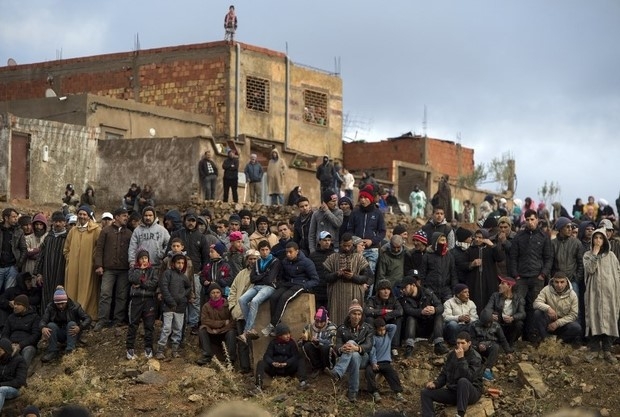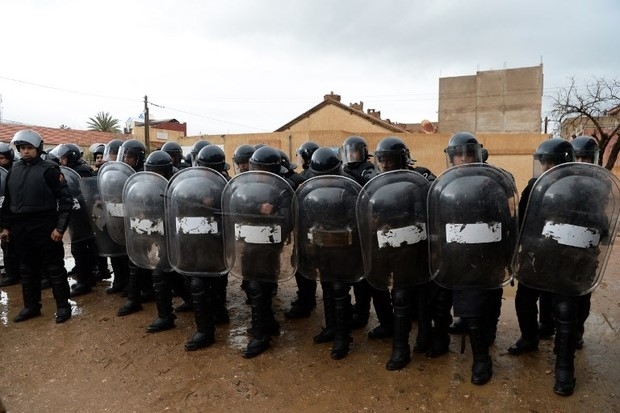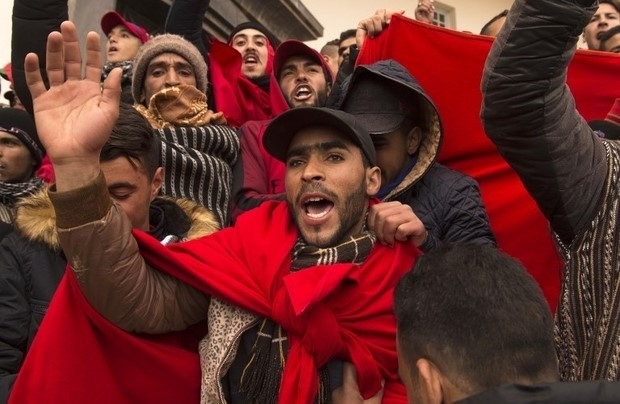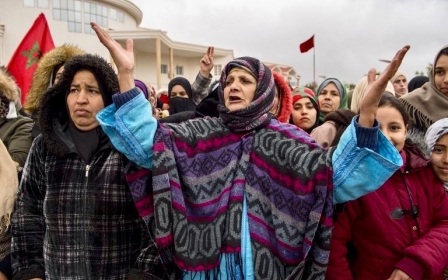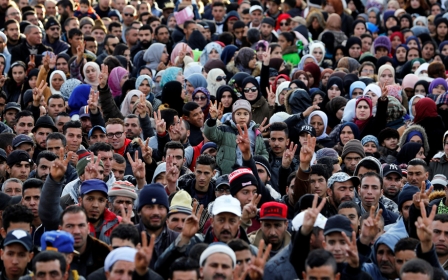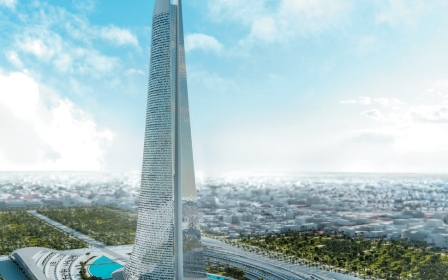Protests over Morocco's 'death mines' rage on despite intimidation
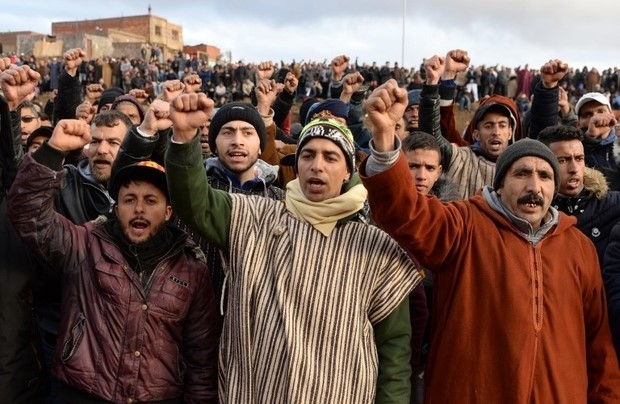
JERADA, Morocco – Ramshackle streets, rudimentary unfinished houses, and unemployed youth killing time in the cafes, dreaming of better futures with a cigarette between their lips. Jerada is everything you would expect of the impoverished Moroccan towns of the Middle Atlas, the arid south, and the nearby Rif.
The only difference is the presence of an impressive array of local and national police on every street corner in town.
“It’s like being in Iraq!” Larbi said, with his booming voice and threadbare jean jacket, a red cap fitted snugly to his head.
But the massive security presence did not stop them from heading to the streets once again by the thousands on 16 March to criticise the government’s neglect of their city.
Called "Silicosis Valley" because of the large number of residents affected by the lung disease, Jerada has been rocked by demonstrations since the deaths last December of two miners trapped in the shaft of an abandoned coal mine. In the weeks that followed, two more died under similar circumstances.
The Morocco Coal Mine, formerly the economic lifeblood of the city, closed some 20 years ago, leaving the residents of Jerada jobless - and with the government’s promise of an action plan that never came.
So miners continue to risk their lives in the unsafe, deserted “death mines” to extract coal by hand. For a handful of dirhams, the coal is sold to local notables, the so-called “coal barons” who are mostly elected officials.
'Firm action'
In February, Moroccan Prime Minister Saadeddine El Othmani visited the region, calling for “open discussions” and announcing a series of development measures for the area.
But after his trip, government authorities opted for time-tested methods to crack down on protestors when they took to the streets, demanding a better plan.
Last week, Moroccan authorities banned all “illegal demonstrations,” stating that they would “take firm action against any irresponsible behaviour,” before proceeding to arrest those leading the protests.
On Wednesday, as violent clashes broke out between police forces and protestors, the growing sense of anger among residents was palpable.
“They did everything they could to provoke us, to trip us up in order to demonise us”
- Larbi, a resident of Jerada
Interior Minister Abdelouafi Laftit defended the government’s actions, reporting that security forces sent to disperse an unauthorised sit-in had been injured, some seriously.
“Government forces will enforce the measures put into place to maintain public safety and order,” he was quoted as saying.
But no mention was made of the injured protestors. “They did everything they could to provoke us, to trip us up in order to demonise us,” said Larbi despondently, shortly before a march planned that afternoon despite the ban.
"They only reported on the wounded policemen and said nothing about the wounded protestors," he said.
The demonstration started from one of the city’s working-class neighbourhoods, the city centre being entirely cordoned off by the police. The protest march quickly gained momentum, gathering at least 10,000 protesters – men, women, children – all walking, despite the steady rainfall, toward Jerada’s central square where local government buildings are located.
They demanded an “economic alternative” to the “death mines” and an end to their marginalisation and also called for the release of the recently arrested activists as riot police looked on.
As if to cast-off any separatist or revolutionary inclination, the protesters brandished the red and green flag of Morocco, and even some portraits of King Mohammed VI.
No pity regarding the political elite
Protestors have little patience for the country's political elite, especially the prime minister, who they said made empty promises which he isn’t strong enough to keep.
“I saw the city. I saw the mines. It’s like the 19th century,” Omar Balafrej, an MP from Rabat with the Federation of the Democratic Left (FDL), told AFP during the Jerada protest which he attended.
“There are as many police as there are residents, and the demonstrations are peaceful.”
We are peaceful individuals who just want enough to eat
- Hassan, Jerada resident
The demonstration ended after three hours without any incidents. The protestors walked for miles, but failed to reach the central square after they were turned away by the police.
"We are peaceful individuals who just want enough to eat," said Hassan, a street peddler selling cigarettes.
At the end of the demonstration, the leaders of Morocco’s latest Hirak - the name borrowed from the "Hirak Rif" protests held after the 2016 death of fishmonger Mohsin Fikri - said they will continue to protest until their demands are met.
Those demands include an economic alternative to the illegal mines, lower water and electricity bills, and the prosecution of the “coal barons” who they say exploit their misery.
With the wave of unprecedented social movements from Al Hoceima in the Rif to Zagora in the south, the kingdom’s authorities have stepped up arrests of protesters in recent months, much to the dismay of human rights advocates.
This piece originally ran on Middle East Eye's French website.
New MEE newsletter: Jerusalem Dispatch
Sign up to get the latest insights and analysis on Israel-Palestine, alongside Turkey Unpacked and other MEE newsletters
Middle East Eye delivers independent and unrivalled coverage and analysis of the Middle East, North Africa and beyond. To learn more about republishing this content and the associated fees, please fill out this form. More about MEE can be found here.


